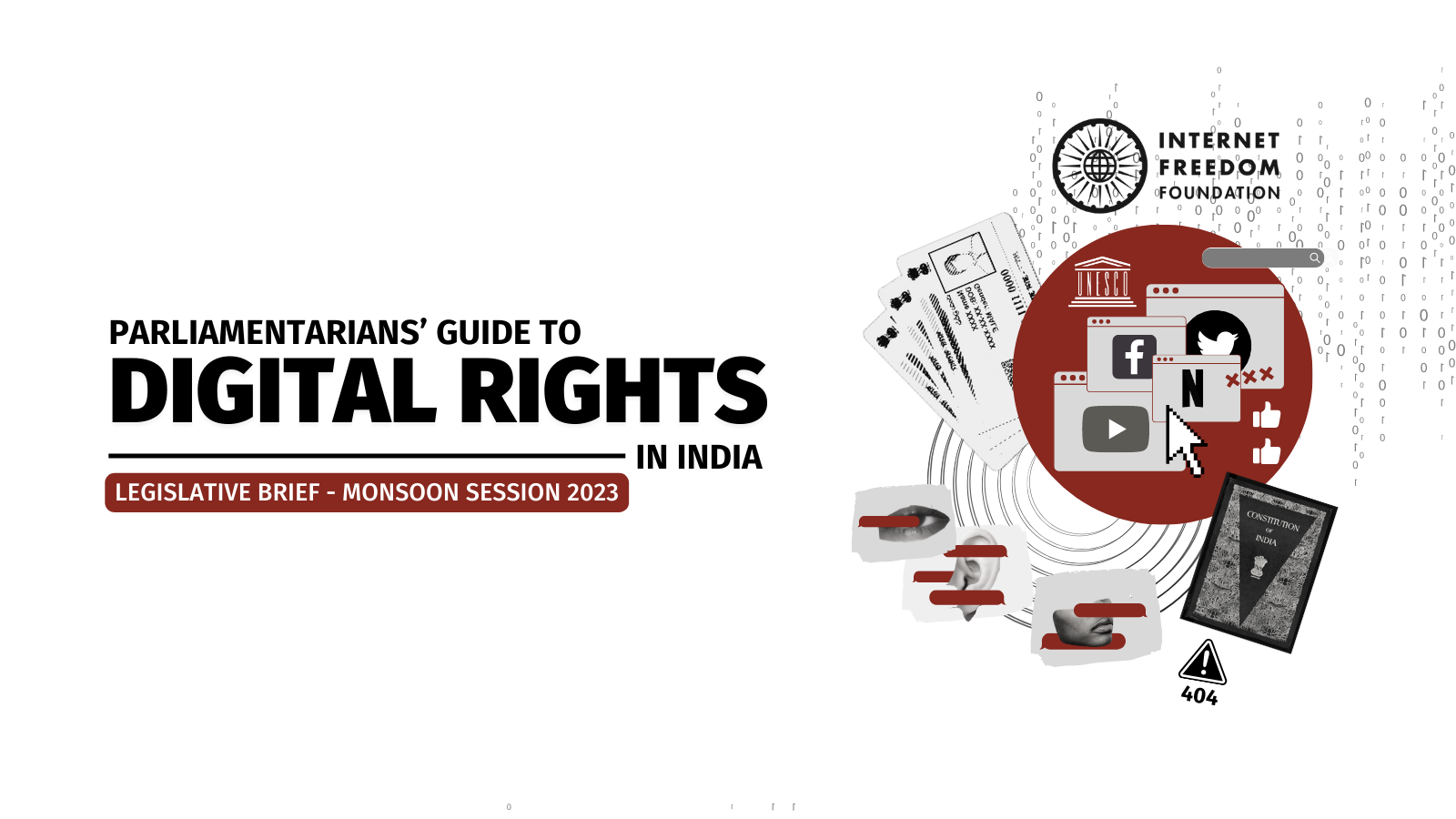
tl;dr
We have prepared our legislative brief on digital rights for the Monsoon Session 2023 of the Indian Parliament. In our brief, we highlight some of the focus areas with the larger issues of digital rights, data privacy, data protection, censorship and other concerns that call for extensive deliberation in the Houses of Parliament.
Introduction
The Monsoon Session of the Indian Parliament will commence on July 20, and is expected to conclude on August 11 as per a press release from the Lok Sabha secretariat.
The previous session of the parliament was adjourned sine die on April 6, 2023, seeing only limited legislative activity due to constant disruption. The Lok Sabha only worked for 33% of its allotted time and the Rajya Sabha for 24%, with over 96 hours being lost to protests by the Lok Sabha during the second half alone and over 103 hours by the Rajya Sabha. In our review of the Budget Session, we had analysed the budgetary allocations for the Ministry of Electronics and Information Technology (MeitY), Department of Telecommunications (DoT), Ministry of Information and Broadcasting (MIB), and Ministry of Home Affairs (MHA).
The upcoming session is expected to be contentious, with 17 sittings and 21 new bills planned, including the controversial Government of NCT of Delhi (Amendment) Bill, 2023. The session is also expected to discuss the Digital Personal Data Protection Bill, 2023 (DPDPB 2023).
Potential issues to be deliberated upon in the upcoming session
- Proposed data privacy bill fails on key safeguards: On November 18, 2022, MeitY released the draft Digital Personal Data Protection Bill, 2022 (“DPDPB, 2022”) for public consultation. The DPDPB, 2022, which aims for simplicity in drafting, lacks crucial foundational principles. It suffers from issues such as inadequate notice requirements and placing burdensome responsibilities and penalties on data principals. Despite growing concerns about increased surveillance in India, the DPDPB, 2022 does not address surveillance reform and allows the Union Government to grant broad exemptions to government agencies for law enforcement purposes. The bill has now been tentatively listed for passing in the forthcoming Monsoon Session.
- Draft telecommunication law replicates the colonial Telegraph Act, 1885: The draft Indian Telecommunication Bill, 2022 (“Telecom Bill, 2022”) was released for public consultation by the DoT on September 21, 2022. The Bill replicates language from the Telegraph Act, 1885, maintaining surveillance powers without any meaningful oversight or accountability processes. It also cements an internet suspension power with the DoT without putting in place any of the procedural safeguards directed by the Indian judiciary and Parliament. Vaguely defined provisions of the bill may lead to legislative overlap due to imposition of licensing requirements on online communication services; weakened right to anonymity; undermined end-to-end encryption; and excessive penalties for users for using services of unlicensed entities.
- Upcoming “Digital India Act”: As part of the government’s ‘comprehensive legal framework’, MeitY has proposed the Digital India Act (“DIA”) - which seeks to overhaul the two-decade-old Information Technology (“IT”) Act, 2000. News reports have revealed that the legislation will “govern the digital space on key issues such as online harm, de-platforming, doxxing, and social media algorithms”, in addition to a prospective list of the types of content that may be regulated. Among the more contentious aspects raised was the potential removal of the ‘safe harbour’ clause for intermediaries, which provides them immunity from liability for third-party hosted content.
- Notified IT Rules Amendments, 2023: On April 06, 2023, the Union Government notified amendments to the Information Technology (Intermediary Guidelines and Digital Media Ethics Code) Rules, 2021 (“IT Amendment Rules, 2023”). The IT Amendment Rules, 2023 primarily introduce amendments in relation to online gaming as well as fact-checking of information related to the Union Government. It is worth noting that these amendments, with its wide ranging implications, were notified despite the IT Rules, 2021 not being tabled in the Lok Sabha. This is deeply concerning as the government, as per parliamentary procedure, is required to table the Rules in the Parliament within 15 sitting days of its notification. Since the IT Amendment Rules, 2023 were notified on the last day of the previous session, the Ministry must table the amended rules within 15 days of the date of commencement of the upcoming session.
a. Fact Check Unit: The amendments allow for a notified fact check unit, (created solely at the discretion of the Union Government), that will be empowered to identify “fake”, “false” or “misleading” online content related to the government. The execution of such a provision may make the Union Government the arbiter of permissible online speech and lead to infringement of the rights to freedom of speech and expression. The constitutionality of this provision is currently under challenge in the Bombay High Court. As per the latest update, the Union Government provided an undertaking to the Court that it will not notify this fact check unit until July 28, 2023.
b. Online Gaming: The amendments introduced a new classification of intermediaries, i.e., ‘online gaming intermediaries’. However, the logical reasoning and justification behind introducing yet another category of intermediaries has not been shared by the Ministry.
- Draft Aadhaar Amendment Rules, 2023: On April 20, 2023, the draft amendments to the Aadhaar Authentication for Good Governance (Social Welfare, Innovation, Knowledge) Rules, 2020 (“Aadhaar Amendment Rules, 2023”) were released for public consultation. The amendments proposed changes to Rule 3, which relates to ‘Purposes for Aadhaar authentication’, to include “promoting ease of living of residents and enabling better access to services for them” as a prescribed purpose. The Rules also propose amendments to Rule 4 to allow any non-government entity, that seeks to be able to perform Aadhaar authentication, to submit a proposal to the “concerned government Ministry or Department” justifying that their intended purpose falls under Rule 3 of the Aadhaar Amendment Rules, 2023. Some of the identified concerns include: an ‘indirect attempt’ at bypassing prohibitions on rule making as per the Supreme Court’s Aadhaar Judgement, defining purposes of ‘Aadhaar’ which exceeds the scope of the parent legislation, and failing the ‘proportionality test’.
There’s this and much more in our Legislative Brief
This is a sneak peek at some of the issues we have covered in-depth in our brief, including data on telecom and internet connectivity; statistics on implementation of schemes; details on key areas of digital governance such as public consultations, privacy and data protection, free speech, access to internet, and surveillance; and digital public infrastructure. For more analysis, statistics, and insight into future legislative developments related to digital rights, see here!
Important documents
- IFFs Legislative Brief on Digital Rights - Monsoon Session 2023 (link)
- IFF Legislative Brief on Digital Rights - Budget Session 2023 (link)
- Prior Legislative Briefs (link)
This post was drafted by Policy Intern Ayana Varghese and reviewed by the Policy Team.


